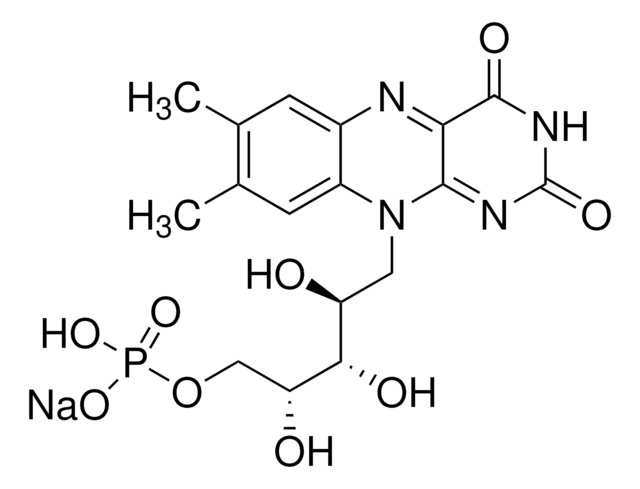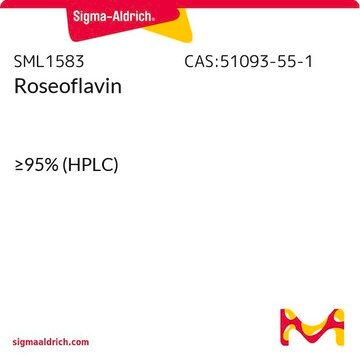F2253
Riboflavin 5′-monophosphate sodium salt hydrate
synthetic, ≥70% (HPLC)
Synonym(s):
FMN-Na, Flavin mononucleotide, Riboflavin 5′-phosphate sodium salt
About This Item
Recommended Products
biological source
synthetic
Quality Level
Assay
≥70% (HPLC)
form
powder
impurities
≤0.3% Riboflavin
solubility
water: 50 mg/mL
storage temp.
−20°C
SMILES string
O.[Na+].Cc1cc2N=C3C(=O)NC(=O)N=C3N(C[C@H](O)[C@H](O)[C@H](O)COP(O)([O-])=O)c2cc1C
InChI
1S/C17H21N4O9P.Na.H2O/c1-7-3-9-10(4-8(7)2)21(15-13(18-9)16(25)20-17(26)19-15)5-11(22)14(24)12(23)6-30-31(27,28)29;;/h3-4,11-12,14,22-24H,5-6H2,1-2H3,(H,20,25,26)(H2,27,28,29);;1H2/q;+1;/p-1/t11-,12+,14-;;/m0../s1
InChI key
BHRVCJBIICJWTH-APQIITSESA-M
Looking for similar products? Visit Product Comparison Guide
Application
- as a component of assay buffer to determine the luminescence of L. lactis cells
- as a component of the reaction mixture in nitric oxide synthase (NOS) enzymatic activity assay
- in the high performance liquid chromatography (HPLC) analysis of Flavin mononucleotide (FMN) cyclase products
- in luciferase assay with firefly luciferase
Biochem/physiol Actions
Storage Class Code
11 - Combustible Solids
WGK
WGK 1
Flash Point(F)
Not applicable
Flash Point(C)
Not applicable
Personal Protective Equipment
Regulatory Listings
Regulatory Listings are mainly provided for chemical products. Only limited information can be provided here for non-chemical products. No entry means none of the components are listed. It is the user’s obligation to ensure the safe and legal use of the product.
JAN Code
F2253-100MG:
F2253-10MG:
F2253-25MG:
F2253-CP:
F2253-BULK:
F2253-VAR:
F2253PROC:
Certificates of Analysis (COA)
Search for Certificates of Analysis (COA) by entering the products Lot/Batch Number. Lot and Batch Numbers can be found on a product’s label following the words ‘Lot’ or ‘Batch’.
Already Own This Product?
Find documentation for the products that you have recently purchased in the Document Library.
Customers Also Viewed
Our team of scientists has experience in all areas of research including Life Science, Material Science, Chemical Synthesis, Chromatography, Analytical and many others.
Contact Technical Service





